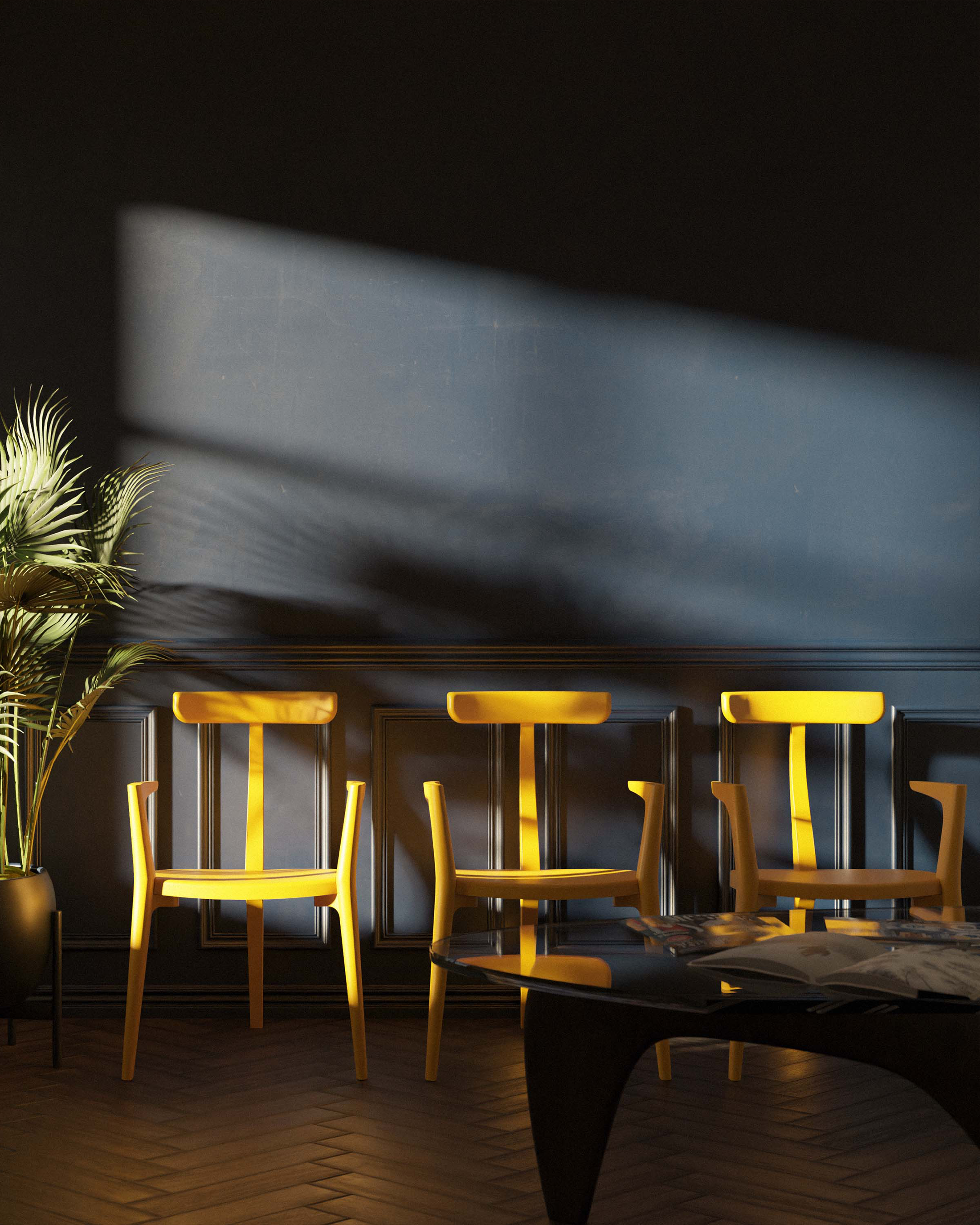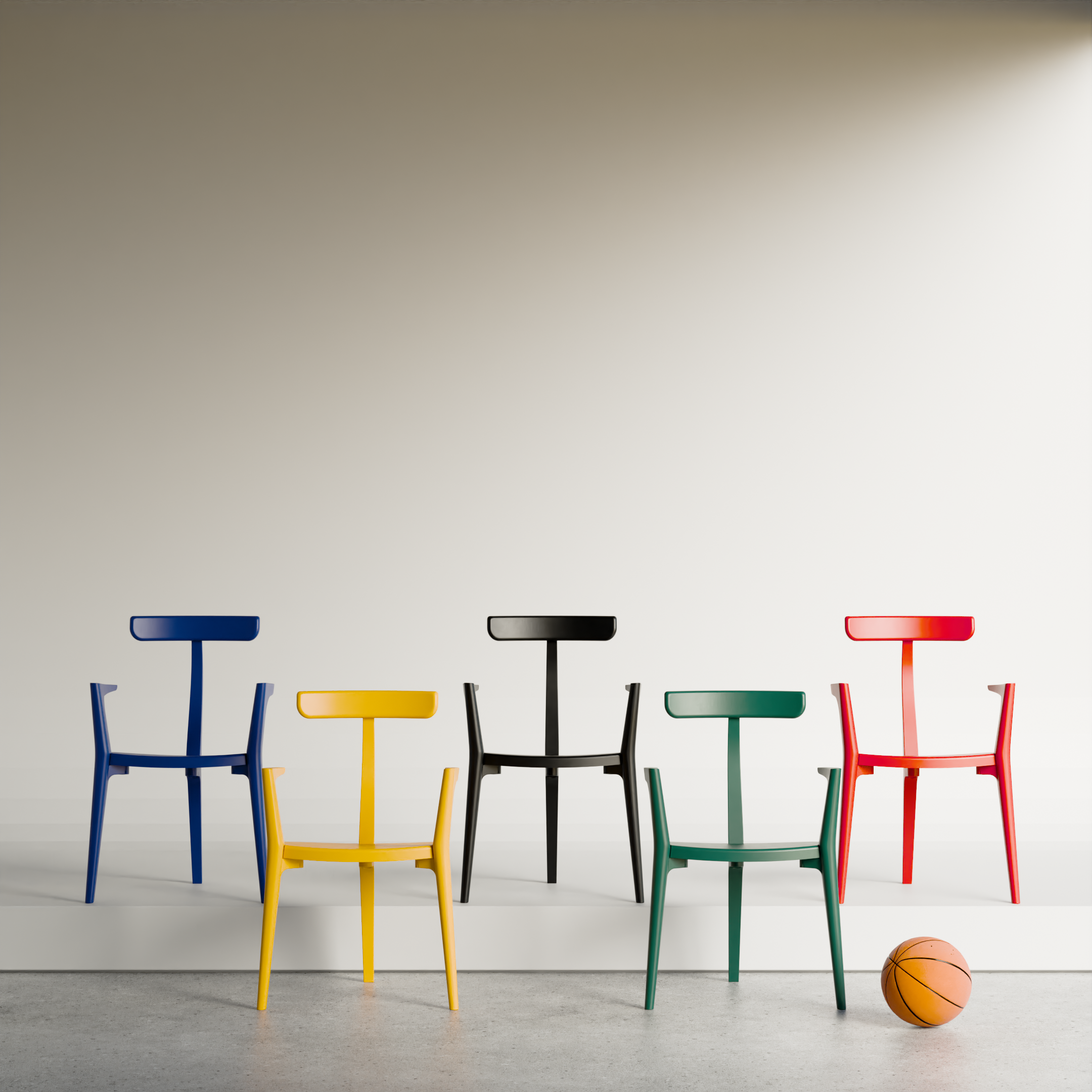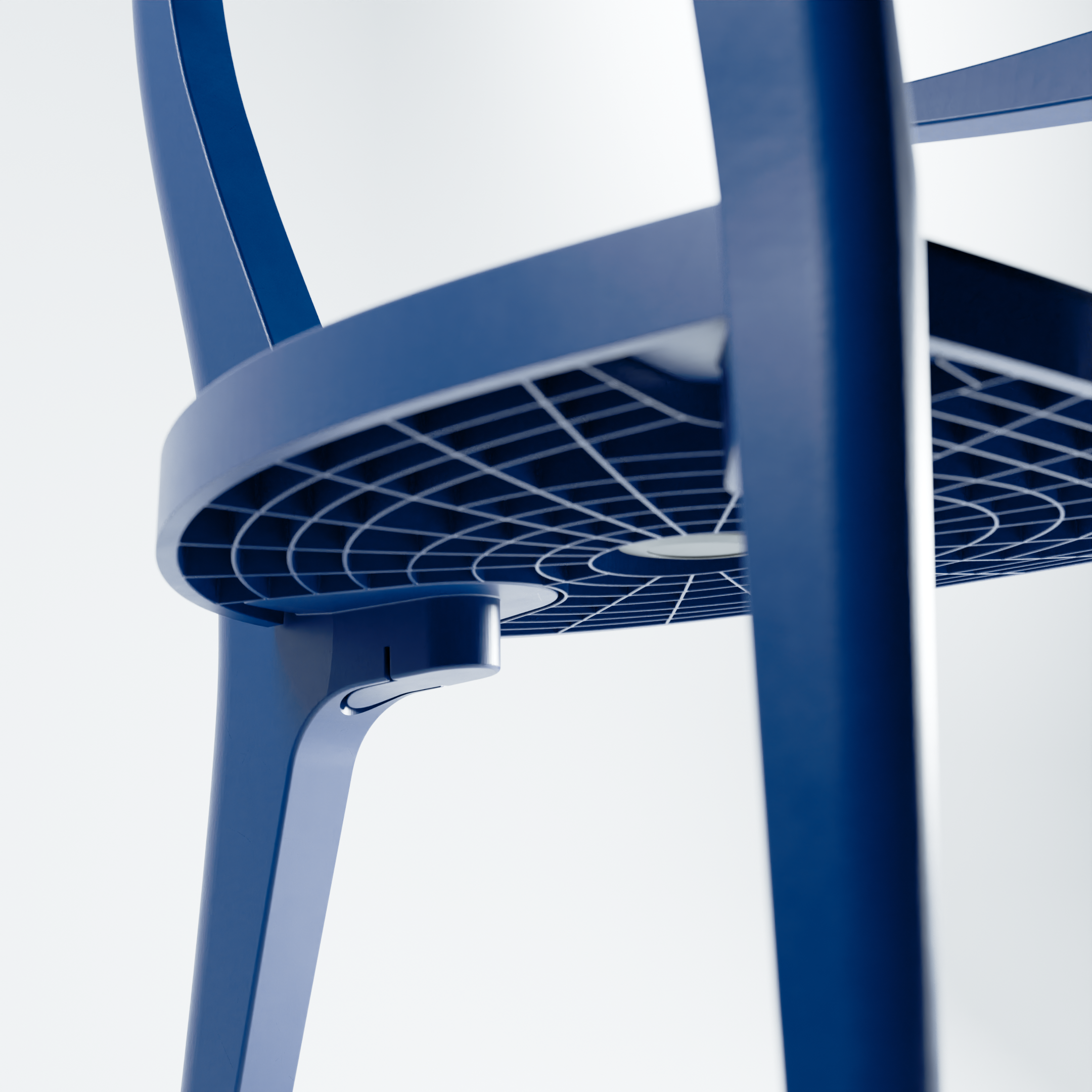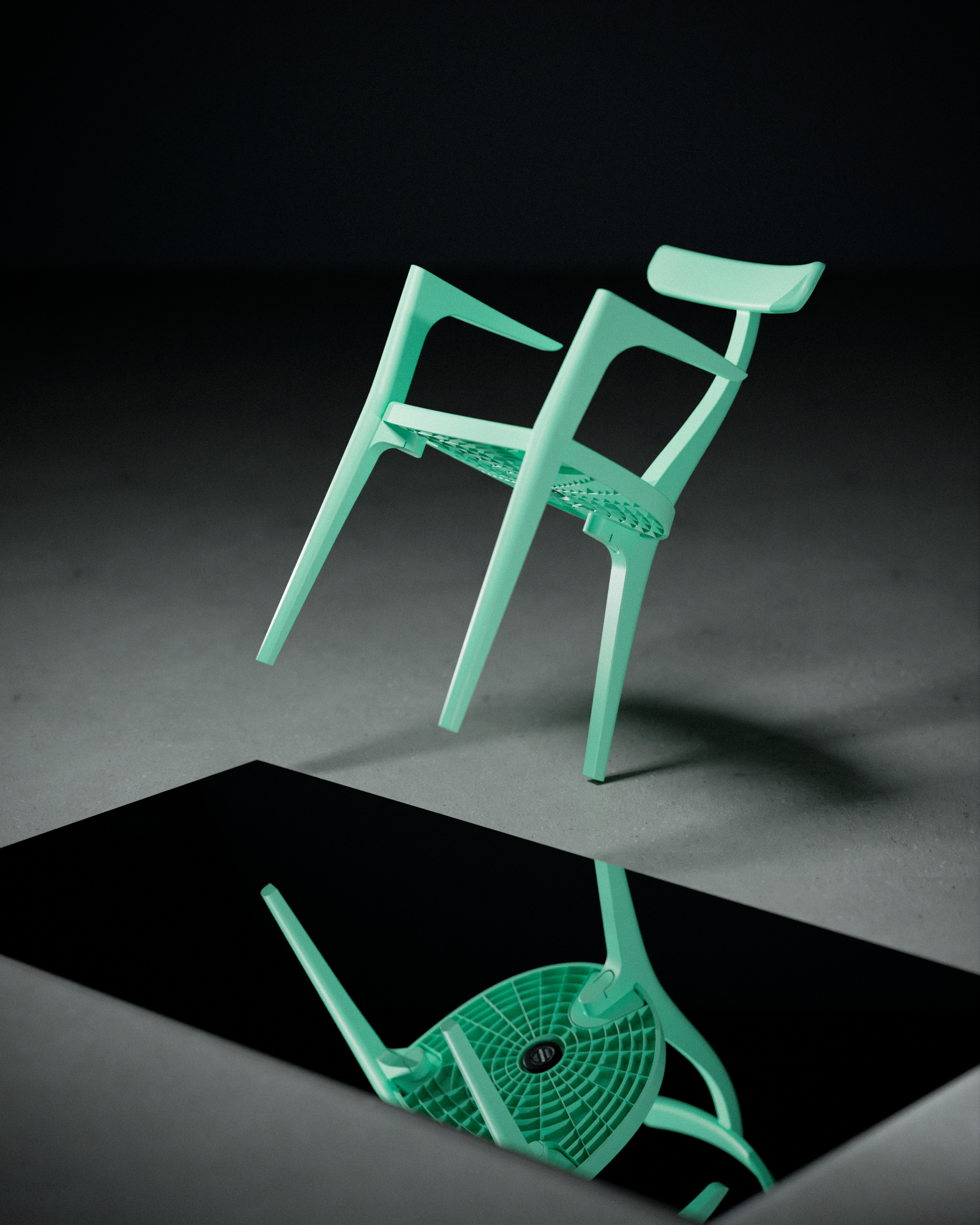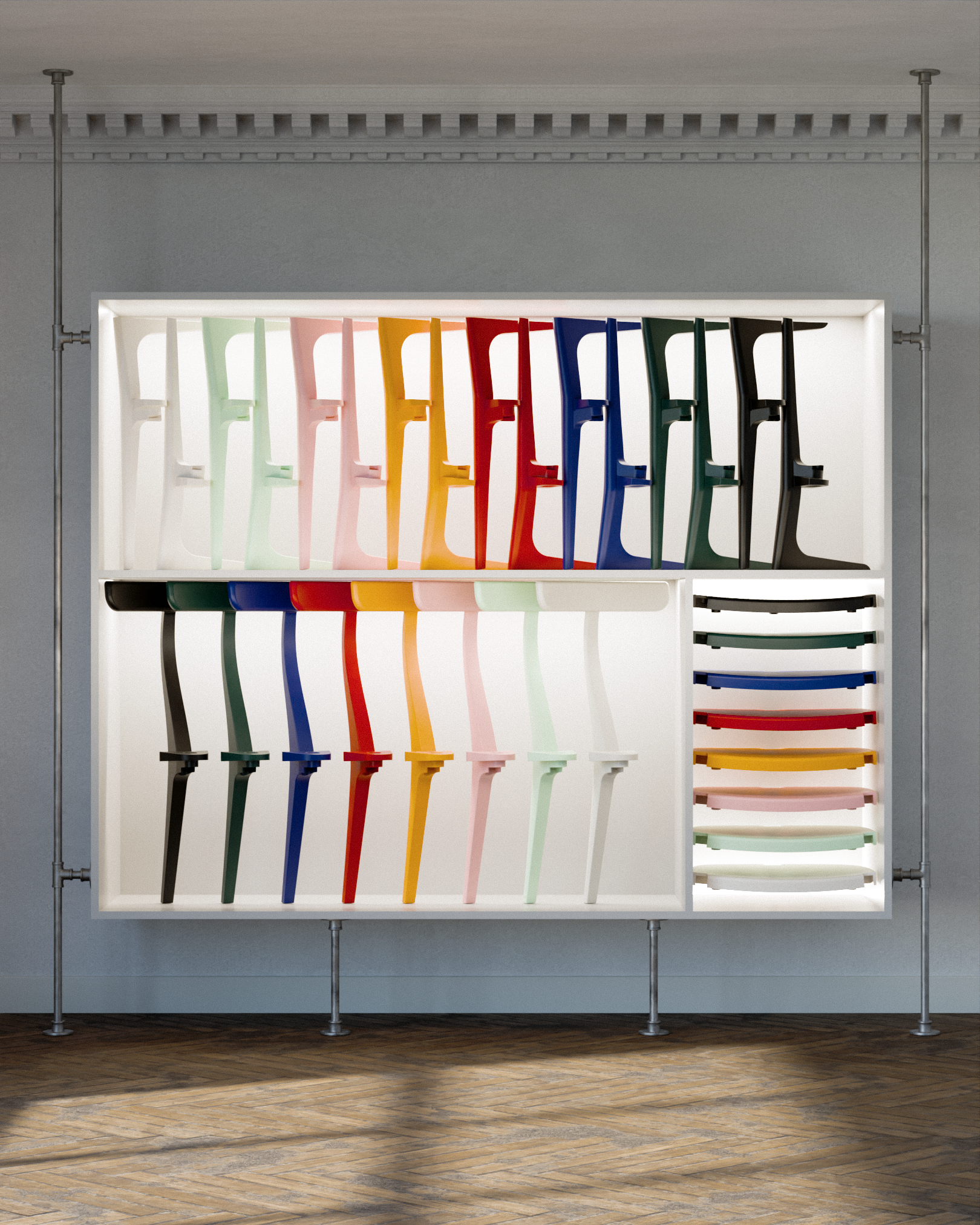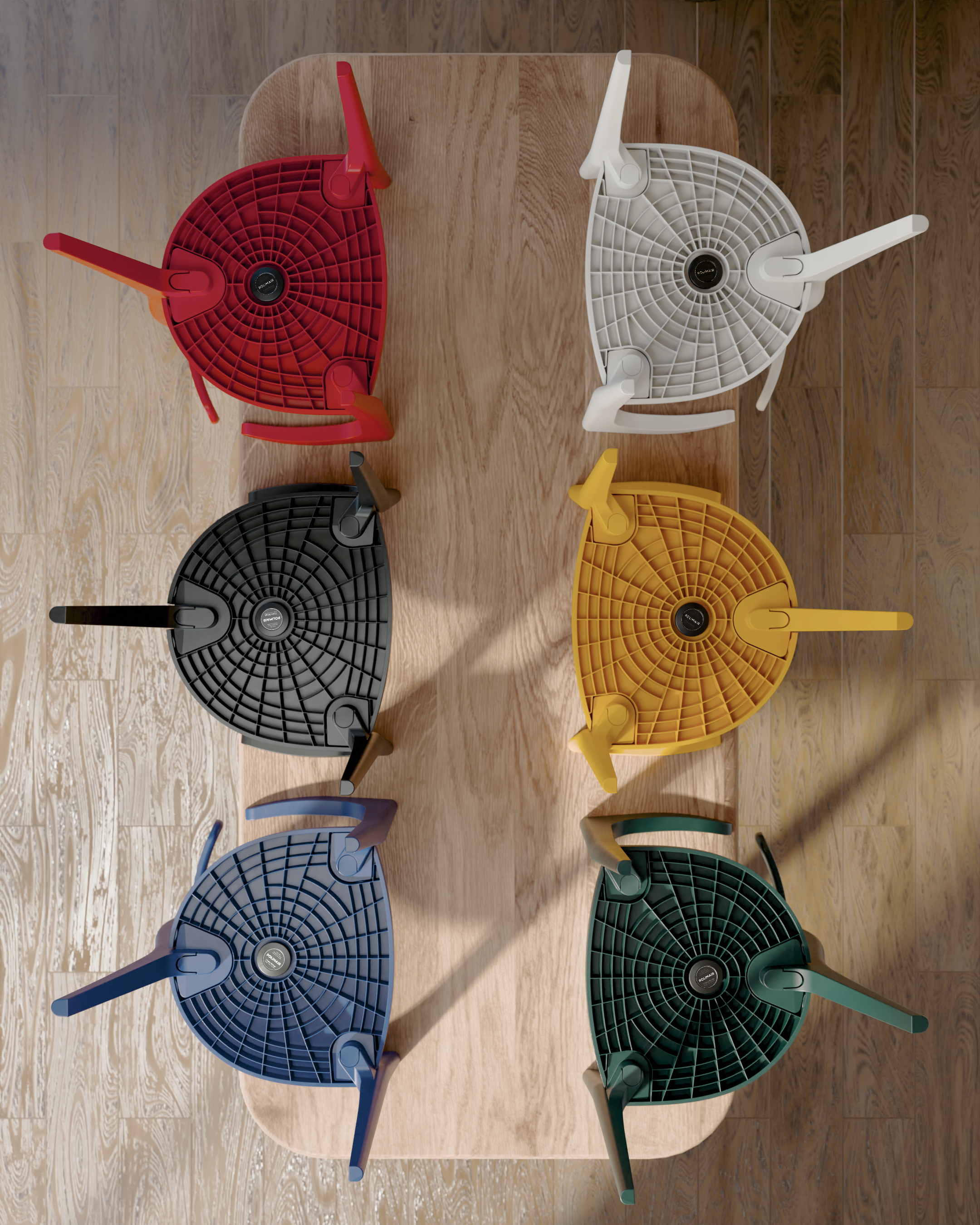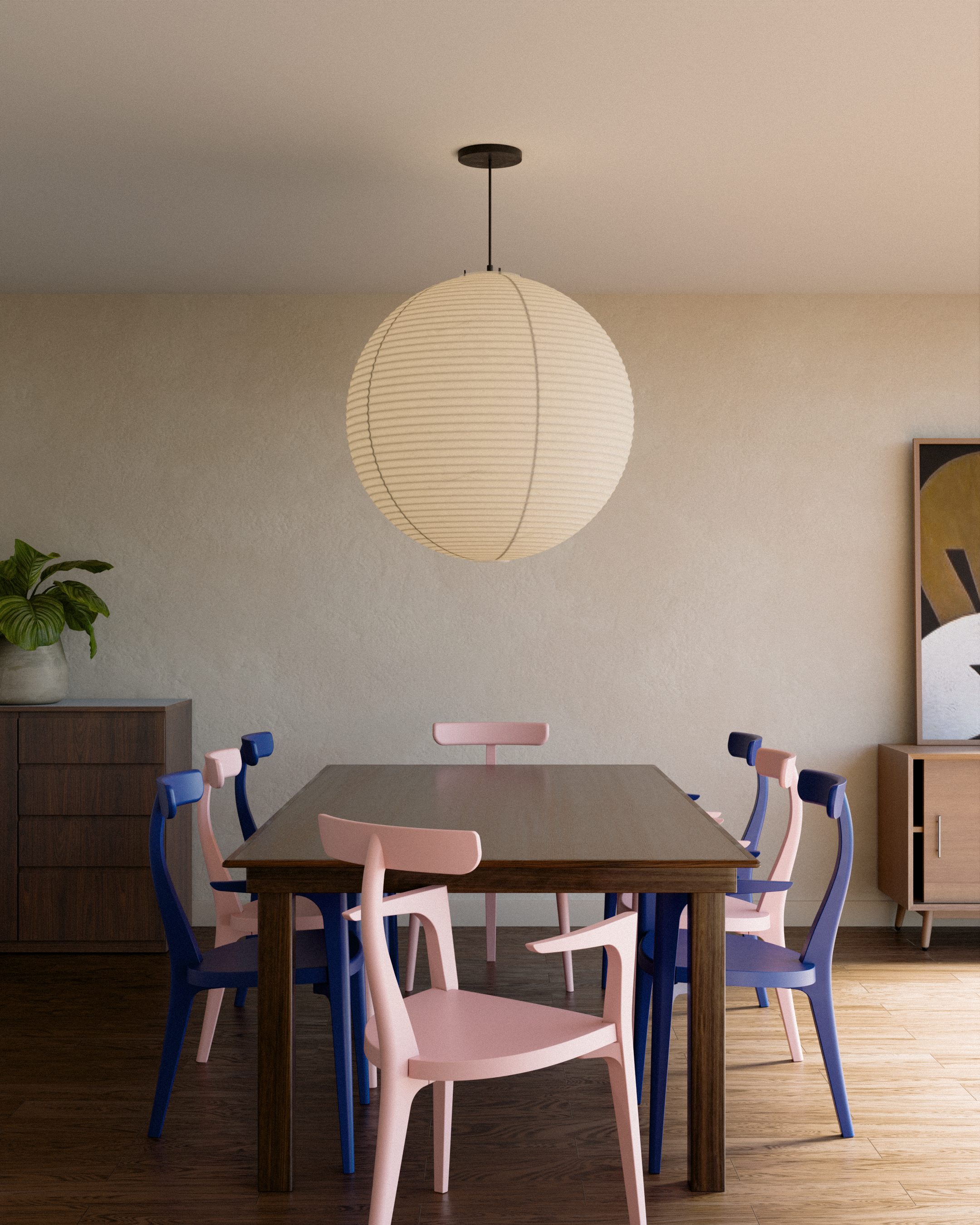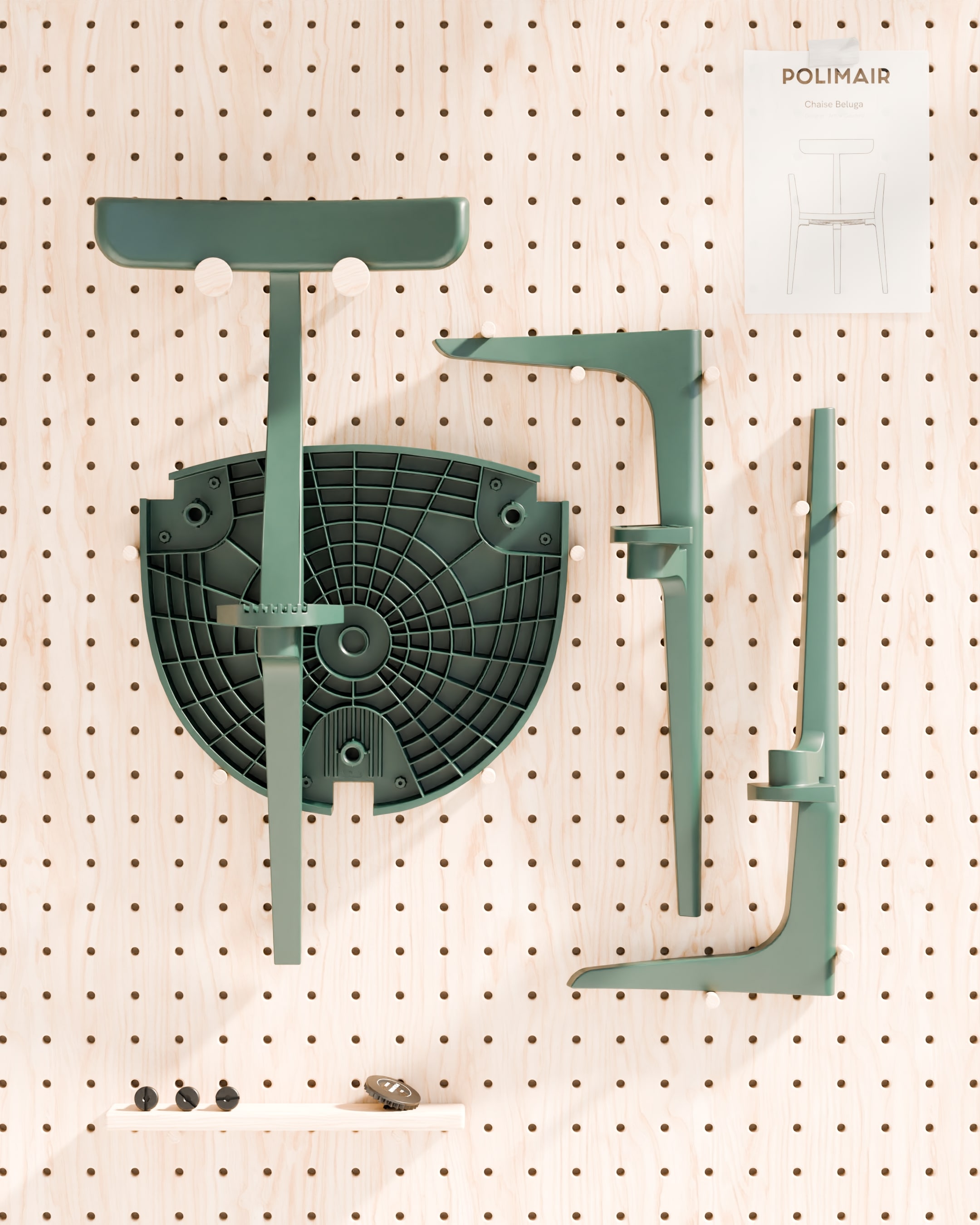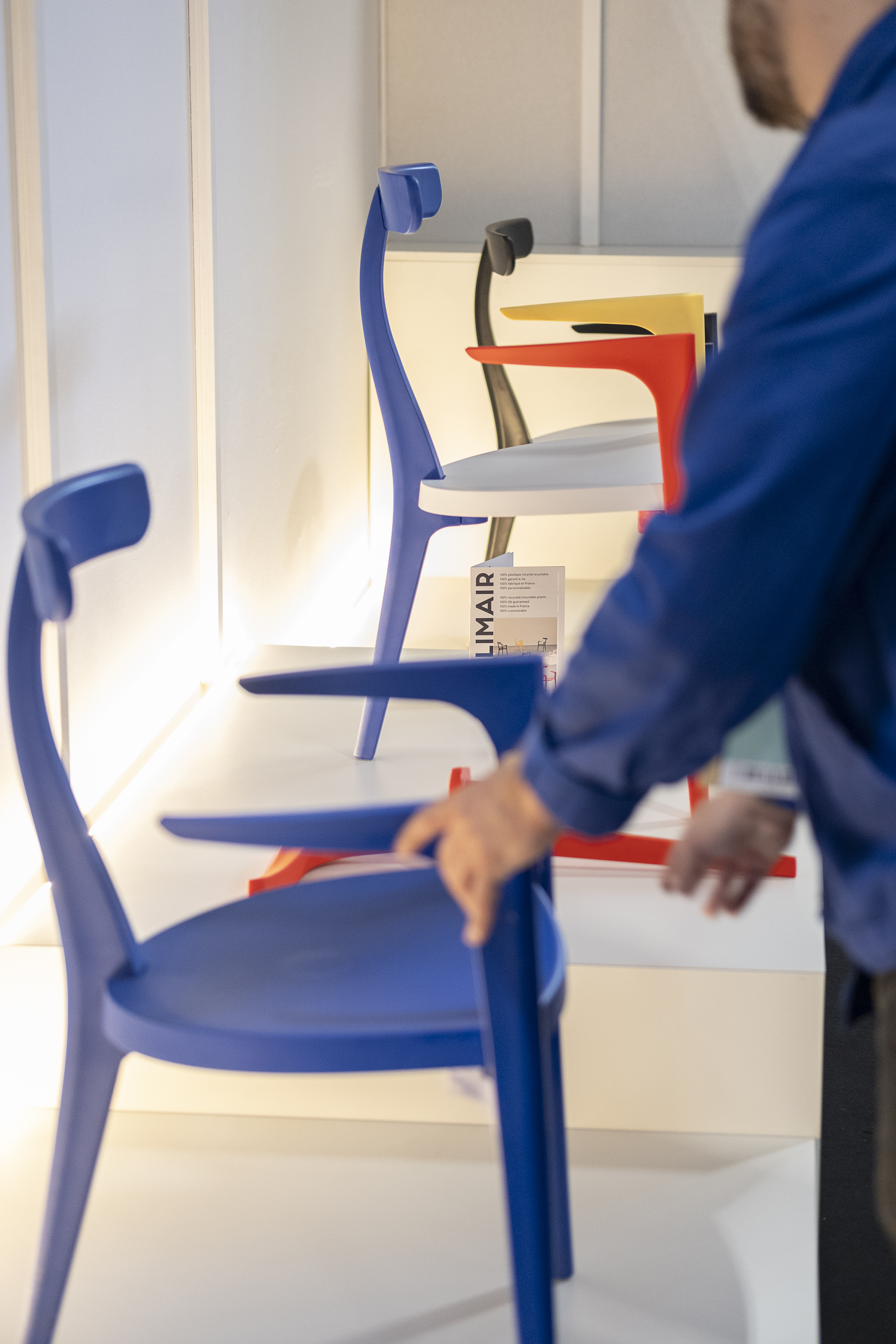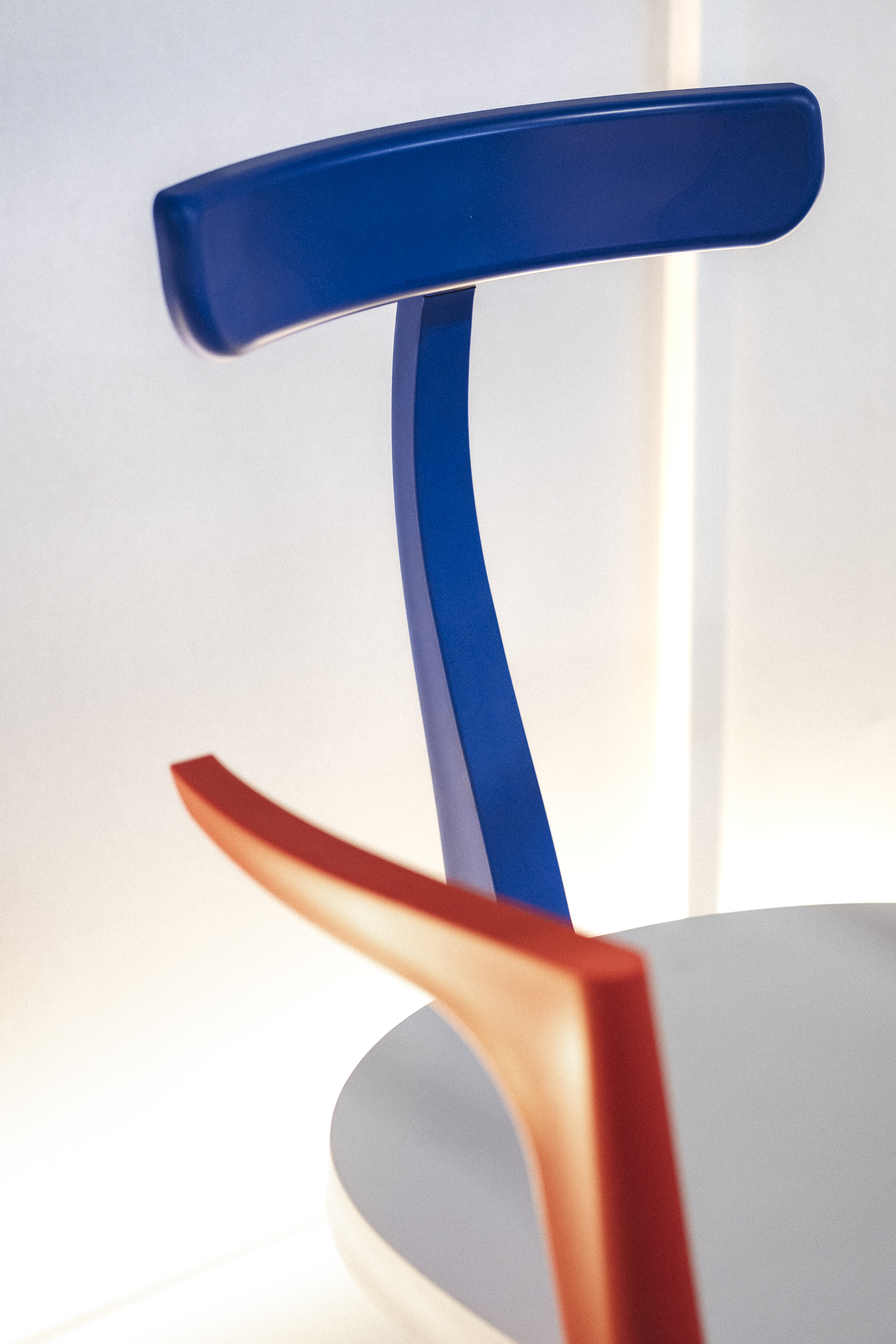Shaping a circular industrial ecosystem and supporting life-cycle thinking
POLIMAIR
POLIMAIR - Redifining plastic
Polimair explores circular industrial ecosystems with the innovative, 100% monomaterial Beluga chair. Made entirely from recycled plastic, this kit chair is designed to be disassembled and remade, supporting a sustainable lifecycle. Our approach aims to transform the furniture industry by combining cutting-edge design with circularity, reducing waste and promoting resource efficiency, while paving the way for more sustainable production methods.
France
National
Mainly urban
It refers to a physical transformation of the built environment (hard investment)
Yes
2025-01-18
No
No
No
As a representative of an organisation
Polimair integrates the core values of the New European Bauhaus by combining sustainability, inclusion, and aesthetics through innovative solutions. Our flagship product, the Beluga chair, is made from 100% recycled plastic and is fully recyclable, embodying our commitment to circularity. This product represents a sustainable industrial model in the furniture sector, focusing on waste reduction and resource efficiency.
The recycled plastic used in the Beluga chair reduces the need for virgin resources and minimizes plastic waste. This circular approach is reinforced by a 100% lifetime guarantee, not to promise indestructibility, but to emphasize that sustainability means taking full responsibility for a product's end of life, ensuring it can be reincorporated into the material cycle. This reduces environmental impact and prevents the chair from ending up in landfills.
We also promote inclusivity with a 100% customizable chair, allowing users to adapt the product to their needs while maintaining sustainability principles. Additionally, it is 100% made in France, supporting local production and reducing the carbon footprint associated with transportation.
This project directly addresses specific challenges like plastic waste, resource depletion, and the environmental footprint of production processes. By creating durable, recyclable, and customizable products, we provide a solution that fits into a circular economy and encourages other industries to adopt similar practices. In the long term, our approach has the potential to inspire a shift in consumer behavior toward more sustainable choices, fostering a more sustainable, inclusive, and environmentally responsible society.
The recycled plastic used in the Beluga chair reduces the need for virgin resources and minimizes plastic waste. This circular approach is reinforced by a 100% lifetime guarantee, not to promise indestructibility, but to emphasize that sustainability means taking full responsibility for a product's end of life, ensuring it can be reincorporated into the material cycle. This reduces environmental impact and prevents the chair from ending up in landfills.
We also promote inclusivity with a 100% customizable chair, allowing users to adapt the product to their needs while maintaining sustainability principles. Additionally, it is 100% made in France, supporting local production and reducing the carbon footprint associated with transportation.
This project directly addresses specific challenges like plastic waste, resource depletion, and the environmental footprint of production processes. By creating durable, recyclable, and customizable products, we provide a solution that fits into a circular economy and encourages other industries to adopt similar practices. In the long term, our approach has the potential to inspire a shift in consumer behavior toward more sustainable choices, fostering a more sustainable, inclusive, and environmentally responsible society.
Sustainability
Design
Innovation
Recycling
Circularity
In terms of sustainability, our primary goal is to minimize environmental impact by using 100% recycled plastic in the production of the Beluga chair. This material choice significantly reduces the need for virgin plastic, cuts down on plastic waste, and supports the circular economy by ensuring that the product is fully recyclable at the end of its life. Our design is built around circularity, ensuring that the chair can be disassembled and remade, contributing to the reuse of materials rather than their disposal.
A life cycle analysis conducted by ECO IMPACT shows that the Beluga chair has 55% less environmental impact than the industry average—an extraordinary achievement, especially for a product made from recycled plastic. This makes it rare in its category and demonstrates the effectiveness of our approach to sustainability. In its first year, Polimair recycled 4 tons of plastic, with plans to double this amount in 2025, further emphasizing our commitment to reducing waste and fostering a circular ecosystem.
The 100% lifetime guarantee supports the sustainable philosophy behind the Beluga chair. It is not about claiming indestructibility, but about taking full responsibility for the product’s entire lifecycle, ensuring it can be recycled again when it reaches the end of its life. This holistic approach to sustainability allows the Beluga chair to serve as an exemplary model in the context of the New European Bauhaus, showing that design and sustainability can coexist in meaningful and impactful ways.
Polimair’s project proves that it is possible to combine cutting-edge design with sustainable production practices, offering a solution that not only reduces environmental impact but also contributes to a more circular, inclusive, and aesthetically conscious future.
A life cycle analysis conducted by ECO IMPACT shows that the Beluga chair has 55% less environmental impact than the industry average—an extraordinary achievement, especially for a product made from recycled plastic. This makes it rare in its category and demonstrates the effectiveness of our approach to sustainability. In its first year, Polimair recycled 4 tons of plastic, with plans to double this amount in 2025, further emphasizing our commitment to reducing waste and fostering a circular ecosystem.
The 100% lifetime guarantee supports the sustainable philosophy behind the Beluga chair. It is not about claiming indestructibility, but about taking full responsibility for the product’s entire lifecycle, ensuring it can be recycled again when it reaches the end of its life. This holistic approach to sustainability allows the Beluga chair to serve as an exemplary model in the context of the New European Bauhaus, showing that design and sustainability can coexist in meaningful and impactful ways.
Polimair’s project proves that it is possible to combine cutting-edge design with sustainable production practices, offering a solution that not only reduces environmental impact but also contributes to a more circular, inclusive, and aesthetically conscious future.
Polimair’s project reflects the New European Bauhaus core value of aesthetics by merging sustainability with thoughtful design to enhance people's lives. Influenced by the original Bauhaus movement and renowned French, Scandinavian, and American design traditions, our approach emphasizes the power of design to create desire and shift mindsets. We believe that to change how we relate to plastics, we must offer a new way to consume them and elevate their value.
Our aesthetic vision is embodied in the Beluga chair, which combines sustainable innovation with elegant design. The chair’s minimalist, timeless form makes sustainability desirable, offering both functionality and emotional connection to the user. We aim to demonstrate that beauty and sustainability can coexist seamlessly.
Polimair’s design approach has been validated by major platforms such as DesignBoom and Intramuros, and the Beluga chair has been celebrated at prestigious events like Milan Design Week. It is also sold in the Centre Pompidou boutique, further establishing its cultural and aesthetic significance. Additionally, as a finalist at the Innovation Awards, the Beluga chair exemplifies how sustainable products can make a lasting cultural impact.
This project is exemplary because it shows how design can drive cultural transformation. By reimagining plastic waste as a desirable, functional product, Polimair offers a new vision for material consumption. Our work proves that beautiful, well-crafted design can be both environmentally responsible and culturally significant, inspiring a shift towards a more sustainable future where aesthetics play a key role in how we engage with the world around us.
Our aesthetic vision is embodied in the Beluga chair, which combines sustainable innovation with elegant design. The chair’s minimalist, timeless form makes sustainability desirable, offering both functionality and emotional connection to the user. We aim to demonstrate that beauty and sustainability can coexist seamlessly.
Polimair’s design approach has been validated by major platforms such as DesignBoom and Intramuros, and the Beluga chair has been celebrated at prestigious events like Milan Design Week. It is also sold in the Centre Pompidou boutique, further establishing its cultural and aesthetic significance. Additionally, as a finalist at the Innovation Awards, the Beluga chair exemplifies how sustainable products can make a lasting cultural impact.
This project is exemplary because it shows how design can drive cultural transformation. By reimagining plastic waste as a desirable, functional product, Polimair offers a new vision for material consumption. Our work proves that beautiful, well-crafted design can be both environmentally responsible and culturally significant, inspiring a shift towards a more sustainable future where aesthetics play a key role in how we engage with the world around us.
Polimair’s project embodies the core value of inclusion by integrating principles of accessibility, social responsibility, and community support in both design and production. As a young company, we are committed to building an inclusive business model that goes beyond the product, ensuring that our actions align with our values from the start.
One of the key elements of our inclusivity strategy is the 100% lifetime guarantee. This guarantee is not merely a business promise but a commitment to take full responsibility for the product’s entire lifecycle. We believe that sustainability should not be driven by short-term economic profit but by a long-term commitment to people and the environment. By guaranteeing that our products can be recycled and reused, we engage society in its responsibility to the planet, fostering a culture of sustainability.
Additionally, we support social inclusion by working with ESATs (Établissements et Services d'Aide par le Travail), which help reintegrate people with disabilities into the workforce. Our collaboration with ESATs for stock management, packaging, and follow-up services offers valuable employment opportunities, empowering individuals distanced from the job market. This collaboration directly aligns with our vision of a society where economic success and social responsibility can coexist.
As a young company, we are dedicated to gender equality in all our hiring practices. From the outset, we will ensure that all our hires reflect full gender diversity. We are also committed to reinforcing our efforts to employ individuals distanced from the job market, further supporting our broader inclusion goals.
Polimair’s approach is exemplary because it shows that businesses can thrive while prioritizing social and environmental responsibility. Through our lifetime guarantee, collaboration with ESATs, and commitment to inclusive hiring, we’re creating a model that values people and sustainability over profit maximization.
One of the key elements of our inclusivity strategy is the 100% lifetime guarantee. This guarantee is not merely a business promise but a commitment to take full responsibility for the product’s entire lifecycle. We believe that sustainability should not be driven by short-term economic profit but by a long-term commitment to people and the environment. By guaranteeing that our products can be recycled and reused, we engage society in its responsibility to the planet, fostering a culture of sustainability.
Additionally, we support social inclusion by working with ESATs (Établissements et Services d'Aide par le Travail), which help reintegrate people with disabilities into the workforce. Our collaboration with ESATs for stock management, packaging, and follow-up services offers valuable employment opportunities, empowering individuals distanced from the job market. This collaboration directly aligns with our vision of a society where economic success and social responsibility can coexist.
As a young company, we are dedicated to gender equality in all our hiring practices. From the outset, we will ensure that all our hires reflect full gender diversity. We are also committed to reinforcing our efforts to employ individuals distanced from the job market, further supporting our broader inclusion goals.
Polimair’s approach is exemplary because it shows that businesses can thrive while prioritizing social and environmental responsibility. Through our lifetime guarantee, collaboration with ESATs, and commitment to inclusive hiring, we’re creating a model that values people and sustainability over profit maximization.
Polimair’s project has been built from the ground up with direct input from key stakeholders such as architects, planners, and businesses, all of whom have helped shape our products based on their sustainability needs. By involving these professionals from the outset, we ensured that our designs meet both the practical requirements and the broader goals of environmental responsibility that are crucial in today’s market. Their involvement has had a significant impact on ensuring that our products are not only sustainable but also suitable for a wide range of applications.
In addition to industry professionals, we have actively engaged with the general public through extensive market research and repeated customer surveys. These efforts allowed us to directly understand the needs, preferences, and concerns of the end users, making the design process truly collaborative. This engagement with citizens has been invaluable in refining the Beluga chair, ensuring that it is both functional and aesthetically appealing while addressing the increasing demand for sustainable products. By involving a broad spectrum of individuals, we created a product that resonates with a diverse audience, from industry professionals to consumers.
The involvement of both civil society and industry stakeholders has had a profound impact on the project, allowing us to refine our designs to meet real-world needs. The inclusion of these voices has ensured that Polimair’s project is not just about producing a product but about creating a shared value that benefits both individuals and communities, advancing the cause of sustainability while fostering greater societal participation.
In addition to industry professionals, we have actively engaged with the general public through extensive market research and repeated customer surveys. These efforts allowed us to directly understand the needs, preferences, and concerns of the end users, making the design process truly collaborative. This engagement with citizens has been invaluable in refining the Beluga chair, ensuring that it is both functional and aesthetically appealing while addressing the increasing demand for sustainable products. By involving a broad spectrum of individuals, we created a product that resonates with a diverse audience, from industry professionals to consumers.
The involvement of both civil society and industry stakeholders has had a profound impact on the project, allowing us to refine our designs to meet real-world needs. The inclusion of these voices has ensured that Polimair’s project is not just about producing a product but about creating a shared value that benefits both individuals and communities, advancing the cause of sustainability while fostering greater societal participation.
Polimair’s project engaged key private stakeholders at various levels—local, regional, and national—through collaborations with architects, designers, planners, and businesses who prioritized sustainability in their work. These private-sector professionals played a crucial role in the design and implementation of the project, providing expertise on both product functionality and market demand. Their involvement ensured that our products met real-world needs, aligning with sustainability goals and driving innovation in the private B2C market.
The added value of their engagement was the ability to create a product that not only addresses environmental concerns but also meets the high standards of design and functionality required by industry leaders. This collaboration has allowed us to fine-tune the Beluga chair to appeal to a discerning audience while maintaining our commitment to sustainability.
The added value of their engagement was the ability to create a product that not only addresses environmental concerns but also meets the high standards of design and functionality required by industry leaders. This collaboration has allowed us to fine-tune the Beluga chair to appeal to a discerning audience while maintaining our commitment to sustainability.
Polimair’s project lies at the intersection of design, industry, and sustainability. From the outset, it has been a collaborative effort, bringing together a diverse range of expertise to create a product that not only meets technical and aesthetic demands but also drives a shift in perceptions of plastic.
Our team combined the knowledge of mechanical engineers, materials experts, manufacturers, and life cycle analysis specialists with designers and communicators. This multidisciplinary collaboration allowed us to consider every aspect of the Beluga chair, from material selection to design and production processes, ensuring that each decision aligned with our sustainability goals.
The interaction between these different fields created significant added value, as it allowed us to design a product that balances form, function, and environmental impact. Engineers and material experts ensured that the chair was made from 100% recycled plastic, while manufacturers provided insights on scalability and production efficiency. Designers and communicators worked to create an object that would not only be sustainable but also visually appealing and marketable, challenging the way people view and consume plastic. This collaborative process was essential in creating a product that is both technically feasible and culturally desirable, demonstrating the power of cross-disciplinary teamwork in driving innovation.
Our team combined the knowledge of mechanical engineers, materials experts, manufacturers, and life cycle analysis specialists with designers and communicators. This multidisciplinary collaboration allowed us to consider every aspect of the Beluga chair, from material selection to design and production processes, ensuring that each decision aligned with our sustainability goals.
The interaction between these different fields created significant added value, as it allowed us to design a product that balances form, function, and environmental impact. Engineers and material experts ensured that the chair was made from 100% recycled plastic, while manufacturers provided insights on scalability and production efficiency. Designers and communicators worked to create an object that would not only be sustainable but also visually appealing and marketable, challenging the way people view and consume plastic. This collaborative process was essential in creating a product that is both technically feasible and culturally desirable, demonstrating the power of cross-disciplinary teamwork in driving innovation.
Polimair’s project is highly innovative compared to mainstream practices in the furniture industry, particularly in terms of sustainability and material usage. The 100% monomaterial recycled kit is a unique feature that sets our product apart. Unlike conventional furniture, the Beluga chair is designed to be fully recyclable, using a single material throughout, which ensures that the product can be easily reprocessed at the end of its life. The reversible assembly system, which does not existe on any other furniture item, allows for easy disassembly without the need for adhesives or permanent fixtures or any other type of material, making the product fully circular and reducing waste.
In addition, the use of massive recycled plastic (as opposed to hollow plastic which is the industry standard) ensures the chair's durability and strength. This solid construction not only increases the lifespan of the product but also challenges the traditional perception of plastic as a fragile material. By using dense, solid recycled plastic, we elevate the value of the material, demonstrating that it can be both strong and sustainable.
Our commitment to zero waste is reflected in the fact that there is no need for sanding or additional finishing processes, which is typical in many furniture production methods. This eliminates unnecessary waste and ensures a more efficient production cycle.
The development of these innovations took 2.5 years of dedicated R&D, involving mechanical engineers, material experts, manufacturers, and designers. This extensive research phase was crucial to ensuring that our product met the highest standards of sustainability, functionality, and design. The result is a product that not only addresses the environmental challenges of the furniture industry but also reshapes how consumers and manufacturers perceive the potential of recycled plastic, setting a new benchmark for sustainable design.
In addition, the use of massive recycled plastic (as opposed to hollow plastic which is the industry standard) ensures the chair's durability and strength. This solid construction not only increases the lifespan of the product but also challenges the traditional perception of plastic as a fragile material. By using dense, solid recycled plastic, we elevate the value of the material, demonstrating that it can be both strong and sustainable.
Our commitment to zero waste is reflected in the fact that there is no need for sanding or additional finishing processes, which is typical in many furniture production methods. This eliminates unnecessary waste and ensures a more efficient production cycle.
The development of these innovations took 2.5 years of dedicated R&D, involving mechanical engineers, material experts, manufacturers, and designers. This extensive research phase was crucial to ensuring that our product met the highest standards of sustainability, functionality, and design. The result is a product that not only addresses the environmental challenges of the furniture industry but also reshapes how consumers and manufacturers perceive the potential of recycled plastic, setting a new benchmark for sustainable design.
The methodology behind Polimair’s project is rooted in a collaborative and rigorous approach that combines expertise across multiple disciplines. Creating a product that serves as a manifesto for sustainable design required assembling a comprehensive team of experts in every relevant field. We focused heavily on a long and thorough R&D phase, which was critical in overcoming technical challenges and ensuring the product’s innovation and sustainability.
From the outset, we decided not to compromise on our commitments to sustainability and circularity, even in the face of significant financial and technical challenges. Developing a product with such a high degree of innovation, especially within the constraints of self-publishing and small-scale production, demanded strong determination. The auto-edition aspect of the project alone is complex, and in this context, we had to convince key partners, stakeholders, and even the public to join us in this endeavor. This process was about more than just design—it was about building a community of collaborators who shared the same values of innovation and sustainability.
The project’s success was built on continuous collaboration with engineers, material experts, manufacturers, and designers, who worked together to create a solution that combines aesthetics, functionality, and environmental responsibility. We also engaged in an iterative design process, testing and refining the product through multiple stages to ensure that the end result would meet our sustainability goals and be adaptable to the demands of the market.
Despite the inherent difficulties, our unwavering commitment to creating an innovative and sustainable product drove the project forward. The process was challenging but ultimately rewarding, as it allowed us to develop a product that truly pushes the boundaries of what is possible in sustainable design while remaining true to our vision and values.
From the outset, we decided not to compromise on our commitments to sustainability and circularity, even in the face of significant financial and technical challenges. Developing a product with such a high degree of innovation, especially within the constraints of self-publishing and small-scale production, demanded strong determination. The auto-edition aspect of the project alone is complex, and in this context, we had to convince key partners, stakeholders, and even the public to join us in this endeavor. This process was about more than just design—it was about building a community of collaborators who shared the same values of innovation and sustainability.
The project’s success was built on continuous collaboration with engineers, material experts, manufacturers, and designers, who worked together to create a solution that combines aesthetics, functionality, and environmental responsibility. We also engaged in an iterative design process, testing and refining the product through multiple stages to ensure that the end result would meet our sustainability goals and be adaptable to the demands of the market.
Despite the inherent difficulties, our unwavering commitment to creating an innovative and sustainable product drove the project forward. The process was challenging but ultimately rewarding, as it allowed us to develop a product that truly pushes the boundaries of what is possible in sustainable design while remaining true to our vision and values.
Polimair’s project is built on a model that is inherently replicable and transferable. Our long-term vision is to collaborate with local manufacturers in each region where Polimair is in demand, allowing us to produce furniture with local plastic using the same molds and processes. For instance, products made for the first member countries would be produced in France, while furniture for Eastern Europe could be manufactured in Poland or Romania, and Nordic countries could produce their own designs in Denmark or Sweden. This approach enables the use of region-specific recycled plastic, supporting local economies and reducing transportation-related carbon footprints, while maintaining consistency in product design and sustainability.
The collaborative methodology behind Polimair allows the project to be easily replicated in different contexts. By working with local manufacturers, we ensure that the project remains adaptable, scalable, and tailored to the unique needs of each region, while also promoting the use of recycled materials on a global scale. The same principles could be applied in various countries, and even continents, as a means of amplifying the impact of circular design and sustainable plastic consumption.
Our core philosophy is that plastic should be treated as a natural resource to be exhausted, not a waste product. This mindset can be adopted by manufacturers and communities worldwide, driving a shift in how plastic is perceived and utilized. By transferring the Polimair model, we aim to foster a new global standard for sustainable production, where local collaboration, recycling, and circular economy practices form the foundation of industrial design. This model not only contributes to a global sustainability movement but also creates an opportunity for communities around the world to take ownership of their waste and transform it into valuable resources.
The collaborative methodology behind Polimair allows the project to be easily replicated in different contexts. By working with local manufacturers, we ensure that the project remains adaptable, scalable, and tailored to the unique needs of each region, while also promoting the use of recycled materials on a global scale. The same principles could be applied in various countries, and even continents, as a means of amplifying the impact of circular design and sustainable plastic consumption.
Our core philosophy is that plastic should be treated as a natural resource to be exhausted, not a waste product. This mindset can be adopted by manufacturers and communities worldwide, driving a shift in how plastic is perceived and utilized. By transferring the Polimair model, we aim to foster a new global standard for sustainable production, where local collaboration, recycling, and circular economy practices form the foundation of industrial design. This model not only contributes to a global sustainability movement but also creates an opportunity for communities around the world to take ownership of their waste and transform it into valuable resources.
Polimair’s project addresses the global challenge of plastic waste by offering local solutions that are tailored to the specific needs and realities of different regions. While plastic pollution is a global issue, the truth often overlooked is that plastic waste has local-specific challenges. Different regions use different types of plastic, recycle at varying rates, and maintain different levels of quality in their recycling processes.
By adapting our production to each region’s specific plastic waste characteristics, Polimair provides a solution that is tailored to local realities. For example, the types of plastic waste generated in Eastern Europe differ from those in Nordic countries, both in terms of material composition and the recycling infrastructure available. Our model allows us to work with local manufacturers to produce furniture using recycled plastic sourced from each region, ensuring that the material is properly processed and meets the quality standards needed for durable, sustainable products.
This localized approach is essential for effectively addressing plastic pollution on a global scale. By creating a model that can be replicated in different contexts, Polimair ensures that each region can produce high-quality, sustainable furniture using locally sourced plastic waste. This not only reduces the environmental footprint associated with transportation but also promotes regional economic development by working with local industries and creating jobs in the recycling and manufacturing sectors.
In this way, Polimair provides a global solution by offering local answers to the plastic crisis, demonstrating that sustainability and circular economy practices must be adapted to regional conditions to truly be effective. By addressing plastic waste through localized production, we can reduce global pollution while fostering local ownership and responsibility for waste management.
By adapting our production to each region’s specific plastic waste characteristics, Polimair provides a solution that is tailored to local realities. For example, the types of plastic waste generated in Eastern Europe differ from those in Nordic countries, both in terms of material composition and the recycling infrastructure available. Our model allows us to work with local manufacturers to produce furniture using recycled plastic sourced from each region, ensuring that the material is properly processed and meets the quality standards needed for durable, sustainable products.
This localized approach is essential for effectively addressing plastic pollution on a global scale. By creating a model that can be replicated in different contexts, Polimair ensures that each region can produce high-quality, sustainable furniture using locally sourced plastic waste. This not only reduces the environmental footprint associated with transportation but also promotes regional economic development by working with local industries and creating jobs in the recycling and manufacturing sectors.
In this way, Polimair provides a global solution by offering local answers to the plastic crisis, demonstrating that sustainability and circular economy practices must be adapted to regional conditions to truly be effective. By addressing plastic waste through localized production, we can reduce global pollution while fostering local ownership and responsibility for waste management.
Polimair’s project has achieved significant environmental results, as demonstrated by the Eco score A, which is based on a rigorous analysis using the Base IMPACTS framework established by ADEME. This score highlights our commitment to sustainability and the substantial reduction in environmental impact compared to mainstream practices.
Key environmental benefits include:
Environmental impact reduction: The Beluga chair has a 55% lower environmental impact compared to the market average for similar products, showcasing our ability to minimize the footprint of furniture production.
Environmental cost: The chair has an environmental cost of 1549 micro points, which is significantly lower than the median product in the chair category, reflecting our sustainable production methods.
Materials: The chair is made from 100% recycled materials, reducing the demand for virgin resources and promoting a circular economy.
Recyclability: The Beluga chair is completely recyclable, ensuring that it can be reincorporated into the material loop at the end of its life, minimizing waste.
Safety: The product contains no harmful substances, making it both safe for users and the environment.
In terms of real-world impact, the first series of Beluga chairs successfully recycled 4.6 tons of post-consumer polypropylene, producing 500 chairs. This action significantly contributes to reducing plastic waste, demonstrating the effectiveness of our circular design approach.
Polimair’s project exemplifies how sustainable practices can lead to significant reductions in environmental impact while offering high-quality, recyclable products. The Eco score A and other outcomes highlight the broader benefits of this project, supporting the transition to a more sustainable and circular furniture industry.
Key environmental benefits include:
Environmental impact reduction: The Beluga chair has a 55% lower environmental impact compared to the market average for similar products, showcasing our ability to minimize the footprint of furniture production.
Environmental cost: The chair has an environmental cost of 1549 micro points, which is significantly lower than the median product in the chair category, reflecting our sustainable production methods.
Materials: The chair is made from 100% recycled materials, reducing the demand for virgin resources and promoting a circular economy.
Recyclability: The Beluga chair is completely recyclable, ensuring that it can be reincorporated into the material loop at the end of its life, minimizing waste.
Safety: The product contains no harmful substances, making it both safe for users and the environment.
In terms of real-world impact, the first series of Beluga chairs successfully recycled 4.6 tons of post-consumer polypropylene, producing 500 chairs. This action significantly contributes to reducing plastic waste, demonstrating the effectiveness of our circular design approach.
Polimair’s project exemplifies how sustainable practices can lead to significant reductions in environmental impact while offering high-quality, recyclable products. The Eco score A and other outcomes highlight the broader benefits of this project, supporting the transition to a more sustainable and circular furniture industry.

